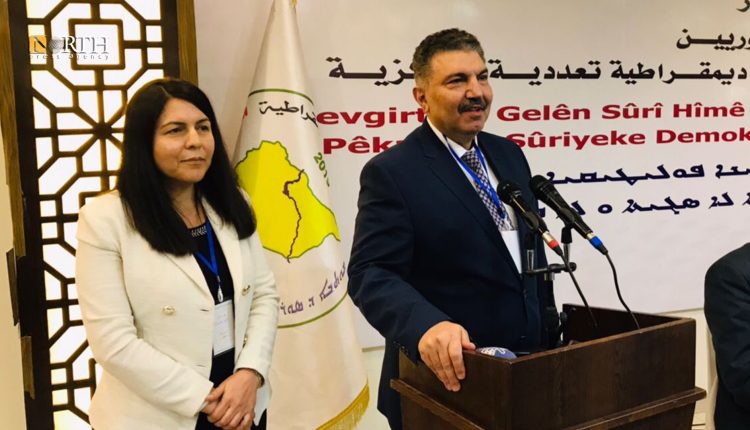By Stella Youssef
QAMISHLI, Syria (North Press) – The Syrian Democratic Council (SDC) held its long awaited fourth conference in Raqqa in northern Syria on Dec. 20, 2023, which ended with presenting a roadmap for the solution of the Syrian conflict and changes in structure and leaders.
The Council is seen as the reference and the political umbrella for the Autonomous Administration of North and East Syria (AANES) and the Syrian Democratic Forces (SDF).
The structure of the SDC, like all AANES institutions, constitutes of a co-chair leadership, a male and female, to ensure full representation of the community in Northeast Syria.
The newly elected co-chairs, Mahmoud al-Meslet and Layla Qaraman, have long work for a resolution for the Syrian crisis, each in a distinct individual way.
Mahmoud al-Meslet
Mahmoud Daham Abdul Aziz al-Meslet was born in Hasakah Governorate in 1974 into the renowned Arab Jubur Tribe. He is a Syrian Opposition figure and holds a Ph.D. in international relations and a master’s degree in Middle Eastern studies. Currently, he is a professor of Middle East studies at Ohio University and Oberlin University.
In 2014, al-Meslet was arrested in Damascus and accused of being affiliated with a banned political organization.
When the Syrian National Council (SNC) was initially formed, he headed the foreign relations office in the U.S. and Canada.
Moreover, al-Meslet holds several prominent positions, including heading the Arab-American Cultural Center for Islamic Studies in Lorraine, Ohio. He leads the Department of Legal Studies and International Relations at Commonwealth University.
Furthermore, al-Meslet played a role in founding the Coalition of Secular and Democratic Syrians in Paris, France.
Layla Qaraman
Layla Rashid Qaraman was born in the village of Sharran of Afrin Region in northwestern Syria in 1980. She hails from a Kurdish family who has a long history of engagement in the Kurdish political movement in Syria.
Qaraman had an extensive political participation in the start of the Rojava Revolution in 2012, or as Kurds of Syria call it “July 19 Revolution,” and the Syrian Revolution, mainly in women’s political movements.
She established the Women Center for Education and Intellect in Aleppo and Afrin, which worked on raising more awareness among women and building female leaders.
She moved to Lebanon and worked as a representative of the diplomatic relations of Kongra Star, a confederation of women’s organizations in Northeast Syria. She worked on improving and consolidating relations with women in north Africa.
Qaraman joined the SDC during its third conference in 2018. She served as a member of the presidential council and deputy co-chair of the SDC.
Later, she joined the Future Syria Party in 2020 and held the position of deputy co-chair of the party.
Both Qaraman and al-Meslet as leaders of the SDC presented a roadmap for a political and peaceful solution to the Syrian conflict.
The SDC aims, through its political process, at ending authoritarianism and centralization, accomplishing a comprehensive democratic change, and rebuilding Syria based on a decentralized and inclusive system. It stresses the need for an intra-Syrian solution through dialogue and direct negotiations in line with the UNSC Resolution 2254 and under international sponsorship and guarantees.

